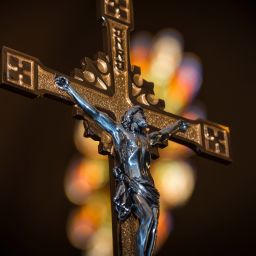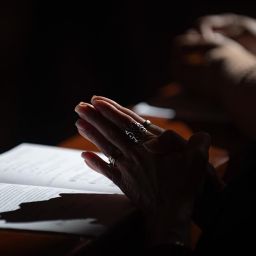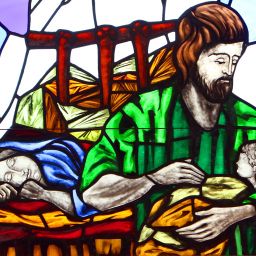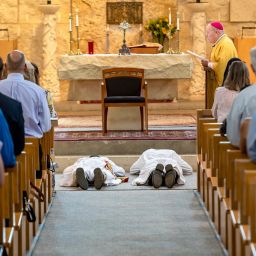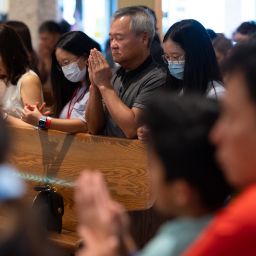By Father John Bayer, O.Cist.
Special to The Texas Catholic
You may know the Church in America is promoting a National Eucharistic Revival. After a few years of grassroots initiatives, it culminates with a major event in July 2024. Check out eucharisticrevival.org for details. Why have a revival? As the authors of the website write, “Our world is hurting. We all need healing, yet many of us are separated from the very source of our strength. Jesus Christ invites us to return to the source and summit of our faith: his Real Presence in the Eucharist.”
What is healing about the Eucharist? That is a good question to ask about any doctrine, since, as we say in the Nicene Creed, God reveals himself for our salvation. Catholic doctrines are not random rules or passwords that allow us to distinguish between those inside or outside a club. They express the mystery of our salvation, albeit in the poverty of human language, and thereby give us a chance to embrace it with our mind and heart.
The Catechism of the Catholic Church says the Eucharist is “the source and summit of the Christian life” and that everything else is “oriented” toward it (1324), for it is “the efficacious sign and sublime cause of that communion in the divine life and that unity of the People of God by which the Church is kept in being.” (1325).
Those lines are more than can be unpacked in a single article. Here I want to focus on one phrase: communion in the divine life.
In John 6, Jesus calls himself “the bread of God” that “comes down from heaven and gives life to the world” (6:33). When the crowds balk at this strange identification (6: 41, 52), Jesus doubles down and insists he should be consumed as the source of eternal life: “Amen, amen, I say to you, unless you eat the flesh of the Son of Man and drink his blood, you do not have life within you” (6:53). Jesus is not speaking merely in metaphors. How do we know that? Because he repeatedly insists his flesh is “true food” and his blood “true drink” (6:55), even when the strangeness of his assertion leads many people to stop following him (6:60-66). If he didn’t want people to wrestle with the radicality of his assertion, would he have just let them walk away?
It would be too easy to fit Jesus into our boxes and tame the mystery of the Eucharist by turning it into a mere metaphor. But Jesus insists it is real: he must really become our nourishment if we are really to live his divine life. “Just as the living Father sent me and I have life because of the Father, so also the one who feeds on me will have life because of me.” (6:57). The Father didn’t metaphorically send the Son; he really sent him. Just so, the one who feeds on Jesus doesn’t metaphorically feed on him; he really feeds on him. Jesus isn’t talking about cannibalism. The bread he becomes is the bread he broke at the Last Supper and declared – by divine fiat – to be his own “body, given up” for our salvation in loving obedience to the Father. We are dealing with a presence that is both real and mystical. As Jesus says, his words are “spirit and life” (6:63). The flesh we consume belongs to the Mystical Body forged through his Passion, Resurrection and Ascension. Hidden beneath the appearance of that ritual bread is the substance of God’s life, given over to become our own.
And what is the substance of God’s life? As he showed us in the Passion, his life is love (1 John 4:8, 16). In John 14-17, Jesus speaks about his return to the Father and his motive for embracing the cross: “the world must know that I love the Father and that I do just as the Father has commanded me” (14:31). If we share in his love – the very love shown in his Passion – then we are in communion with him. “Remain in my love” (15:9). We do this by obeying him just as he obeys the Father: “If you keep my commandments, you will remain in my love, just as I have kept my Father’s commandments and remain in his love” (15:10). And what’s his commandment? “This is my commandment: love one another, as I love you” (15:12). If we do this, then we are united forever in God himself: “one, as you, Father, are in me and I in you, that they also may be in us” (17:21).
How can we poor sinful creatures love as God himself? How can we share in the very substance of his life? What we need is for God to make his love into the new principle of our own. We need the love he displayed in his Passion to become our nourishment. We need the body he gave away in his Passion – his self-offering on the cross – to be handed over to us through the ages to graft us onto him like branches onto a vine. Well, thanks be to God, for on the night he was betrayed, Jesus took bread and declared it to be that body pulsing with divine love. We are not called to dwell in the divine communion metaphorically. By his real presence, we are really there.
Father John Bayer, O. Cist., is a monk at the Cistercian Abbey of Our Lady of Dallas in Irving.



